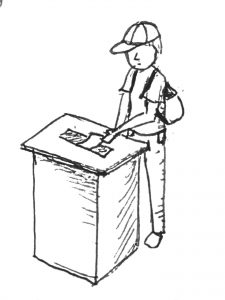COLUMN: County election offers students a voice
 Another month, another ballot. It’s easy to become overwhelmed by the near constant elections, disenchanted by the political system and even apathetic by city issues. But civic engagement, especially for those from Los Angeles County, didn’t end on Nov. 8 — it only started.
Another month, another ballot. It’s easy to become overwhelmed by the near constant elections, disenchanted by the political system and even apathetic by city issues. But civic engagement, especially for those from Los Angeles County, didn’t end on Nov. 8 — it only started.
Although not as tedious as the general election ballot in November, March 7 will greet voters with ballot measures and choices for mayor, city attorney, city controller and eight city council districts.
Before despairing over the prospect of another ballot filled to the brim with acronyms and the names of middle-aged politicians, realize that local elections are often the most important ones. For one, by their nature, fewer people can vote in local elections in comparison to state and national ones with larger electorates, magnifying each voter’s voice. And local elections are notorious for low turnout, meaning that each vote counts even more. In fact, fewer than one in five eligible residents in Los Angeles vote in mayoral elections. Considering that thousands of USC students are eligible L.A. voters, our campus could quite literally change an election.
And we, especially as millennials, cannot afford to remain silent. The median voter age in the most recent mayoral elections across 50 U.S. cities was 57, meaning that baby boomers and other older generations disproportionately shape local politics at the expense of young voters and their interests. It’s simple to view our college experience through the insular campus lens, but we are part of a greater community that needs to hear our voice.
If you wonder why USC should even want to influence the ballot box, local issues often have a greater effect on residents, especially students, than state or national policies do. For example, housing policies developed by ballot measures and city council decisions determine rents for the local area, including the developments surrounding campus. Furthermore, minimum wage hikes and economic policies directly affect job prospects and outcomes for students interning or hoping to stay in the area after graduation.
Even if we hold little stake in this election, with one small stroke of a pen we can take one giant leap for marginalized populations such as the homeless. With just a .25 cent sales tax, Measure H will raise billions of dollars over the next decade to turn the tide in Los Angeles’ struggle to address the largest chronically homeless population in the country. So essentially, for every 110 grande lattes you buy from Starbucks, you pay $1 to fund programs that support the homeless. That’s a sacrifice I hope we’re all willing to make.
And regardless of whether or not we can vote in this local election, it’s our responsibility to be an advocate for the voiceless by encouraging friends to vote and promoting awareness in person or on social media. L.A. County voters especially should practice due diligence by researching the issues and coming to educated decisions for all of our sakes.
A recent USC Dornsife/California Community Foundation/Los Angeles Times poll found that 49 percent of L.A. County residents cited time as a reason why they didn’t get more involved in the community and 39 percent said they weren’t sure what they could do to help. But with voting, we can — in the span of a few minutes — make a difference at little personal cost to ourselves, and possibly, at great benefit to us and others.
Especially if you aren’t from the area, it’s easy to see Los Angeles simply as a launching pad. But as a USC student, and especially as a resident, it’s crucial to be present and to be aware during our years at college. Los Angeles may be known as the City of Dreams, but for many, gentrification, inequality, homelessness, poverty and myriad other issues ground hopes and aspirations. The solution starts with us.
Alec Vandenberg is a freshman majoring in public policy. His column,“Civil and Civic,” runs every other Monday.

